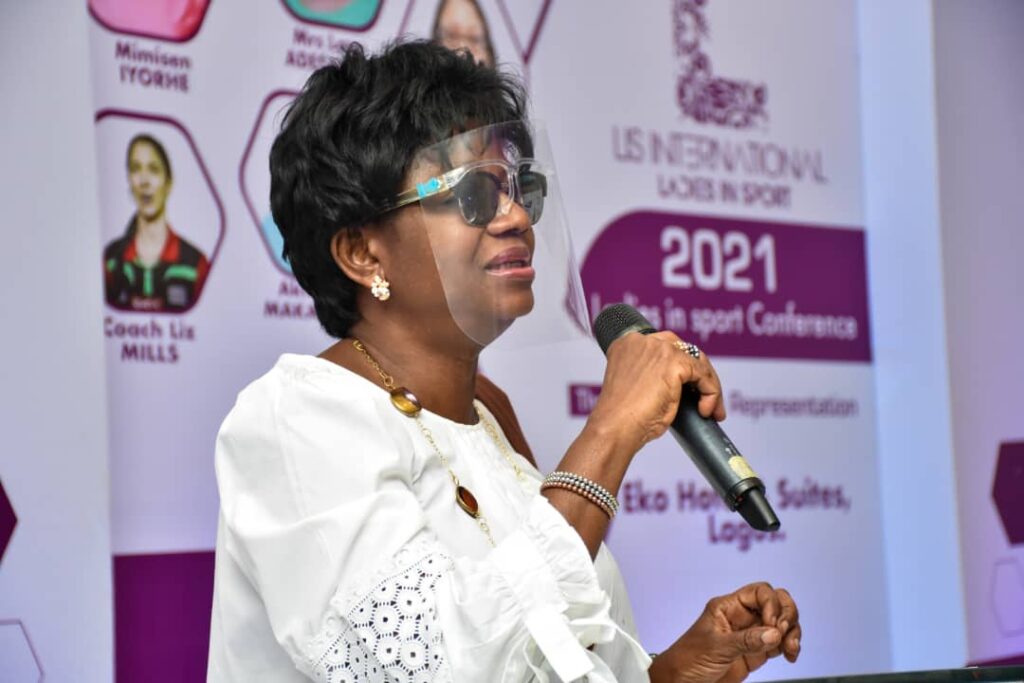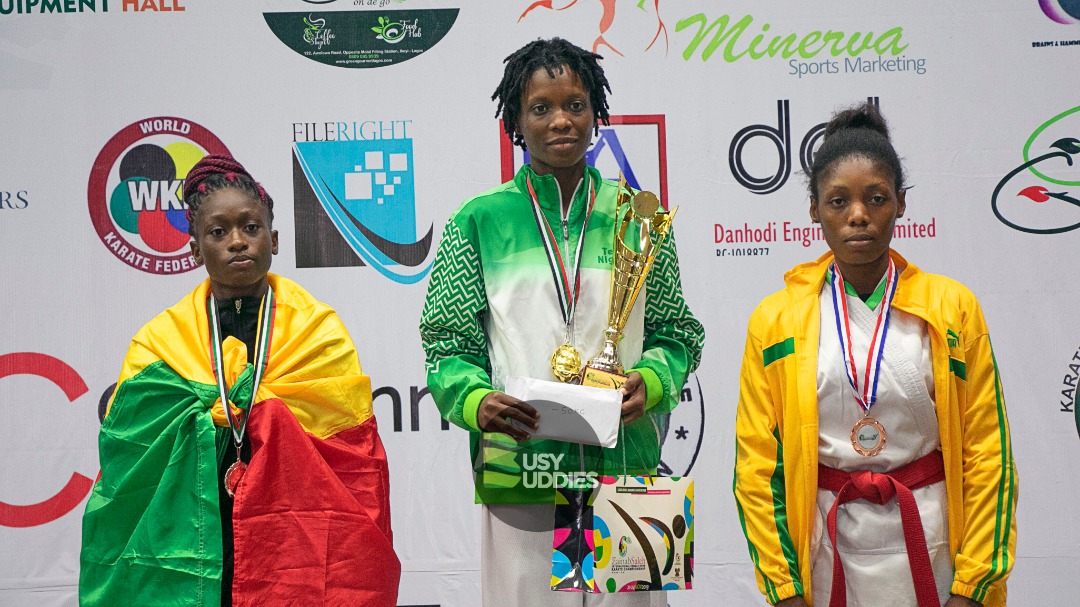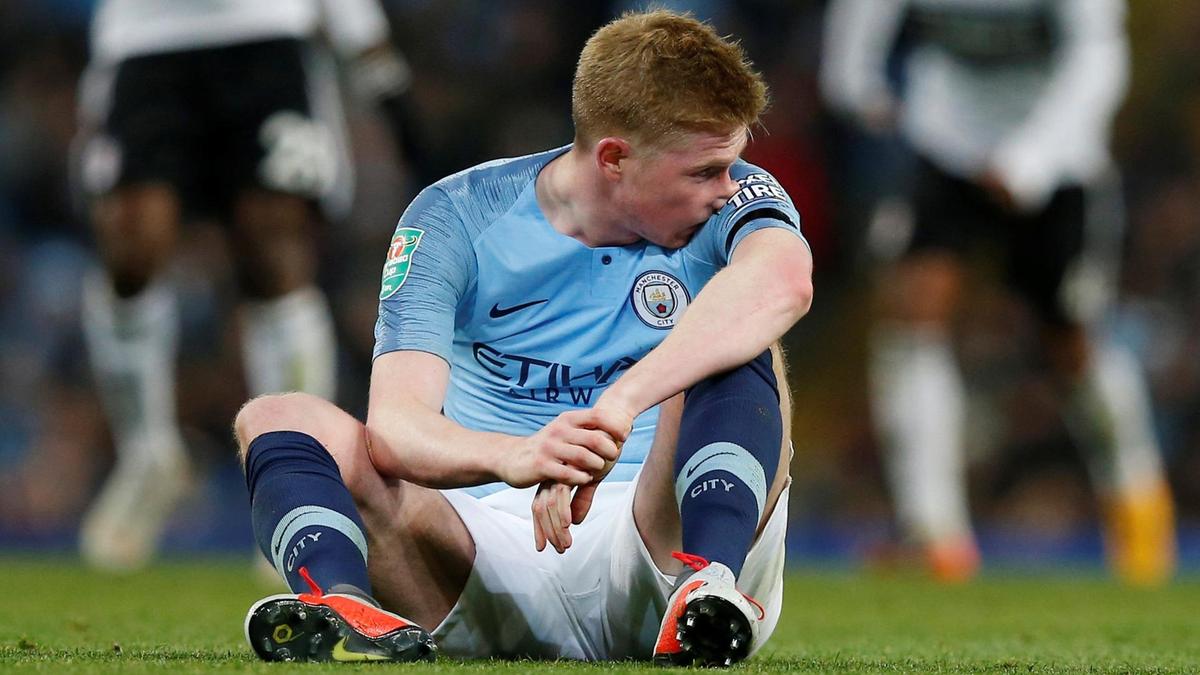
Many of today’s leading women in sports rarely had role models growing up, as they are either the first to achieve a thing or the second, after so many years. However, as the push for gender equality continues to gather momentum, it is important to understand the “Power in Representation”, which was the theme of the Ladies in Sports Conference 2021, held at the Eko Hotel and Suites on Friday, 7 May.
The sixth edition of the annual conference, which was strictly by invitation due to COVID19 restrictions, featured some of the most influential women athletes, referees and coaches across Africa who have smashed the glass ceiling and paved the way for the future generations. Just as Jennifer Foltz, Deputy Public Affairs Officer, United States Consulate, Lagos, aptly pointed out: “When young girls are in school, if they look and don’t see any women in sports, the idea can’t even start in their head they can’t even imagine seeing themselves t here, so they don’t pursue it.”

While speaking ahead of the panel discussions, Foltz outlined some of the steps that have been taken in the United States to advance women in sports, like Title IX of the education amendments of 1972, but added that the US still has a long way to go in achieving gender equality.
Lara Adesanya, Ex Gubernatorial Candidate and member of the Board of Directors of the Central Bank of Nigeria, who took the stage after Foltz, spoke about the many benefits of sports, including building character, encouraging discipline and developing team spirit, while reliving her glory days as a student athlete who starred in the Nigeria Polytechnic Games Association (NIPOGA) in the 70’s and 80’s.

“Failure is the beginning of excellence,” she said, “when you don’t get a gold medal you can always try again.” The first panel of the day put a spotlight on two incredible women referees, South African Akhona Makalima and Nigerian Mimisen Iyorhe.
In January, Makalima made headlines as the only woman referee selected for t he U20 African Cup of Nations that took place in Mauritania. While Iyorhe was part of the allfemale referee team that made history at the 2020 African Nations Championship (CHAN) as the first ever women to officiate a match at a senior CAF men’s tournament.
Growing up in a very rural area of South Africa, Makalima’s chances of making a name for herself as a footballer was quite slim, so she quit after over 11 years, and, coincidentally, this was around the time the South African Football Association was looking for female referees. She is currently the only female referee in her country’s top flight league, the Premier Soccer League (PSL), and she recalled how scared she was before her very first game, because she is a woman and if she makes any mistake “it ’s going to be attached to my gender”.
Makalima eventually stepped onto the pitch with the confidence that “today it is all about me and all about each and every woman that wants to be like me”. She overhead negative comments but that did not deter her.
A player once said to Makalima that her inclusion is “just to promote gender equality”, and some coaches also try to intimidate her with remarks like “go back to the kitchen, you don’t belong here”. But every time she gets an opportunity, “I tell people that I worked so hard to be where I am”. For her it’s important to “show up and bring the quality”.
Makalima’s body has also been a topic of discussion with people telling her that she distracts the players.
“Unfortunately, I’m not going to change the way I dress, the way I look or the way my body is. If they are professional enough, they should be focusing on the ball in front of them,” she said.
Iyorhe did not play football, albeit coming from a family of footballers, but her mother who was a referee influenc ed her to join the officiating side of the sport and she has loved the journey since the first day. “Enjoy yourself,” she said.

“As long as the players are playing a game that you enjoy, you will see that refereeing also flows.” She is grateful for the support from her immediate family as well as the family she is married into. “Support every girl that wants to do sports. The support has to come from home, if it doesn’t then they will be going round circles,” she advised.
Unlike Iyorhe, Nigerian wrestling star Odunayo Adekuoroye’s parents were not supportive of her interest in sports. She shared the story of her wrestling career, which took off soon after her hope of becoming a sprinter was dashed; how her father disowned her after she returned from a 10-day competition that her parents did not know about, and how she always expected to be flogged every time she went back home from training. But her love for the sport grew, the guys that would normally bully her in school became afraid of her and eventually her coach was able to convince her parents.
“Today, my father is proud of me,” she said. Adekuoroye also does not care about what anyone says about how she looks. “I’m not bothered, if you tell me I’m not beautiful, it’s okay.”
The two-time Commonwealth gold medallist has her mind set on this summer’s Tokyo Olympic Games and is looking forward to winning “not just a medal but a gold medal”.

Australian Liz Mills, the first female head coach of Kenya’s basketball team, became the first woman to lead a men’s national basketball team to a major continental tournament in February. Her “rewarding” ten year journey in Africa has seen her work in nine different countries, coaching men’s clubs. But there have also been difficulties, including sexism and discrimination based on her age at the time.
“I used to get really offended and then I brush it off, but now I take the opportunity to educate people that it is not okay to treat women like that, it is not okay that we don’t see more women in these positions, it is not okay that we don’t even see female head coaches coaching women’s basketball teams.
“We need to have age and gender diversity within our decision making groups in the federations. When it comes to coaching we need federations to engage and encourage girls and young women to think about getting into coaching.
Looking at what men can do to help break down barriers, she added: “We need our male coaches to not only take men under their wings, but also identify women who can be great coaches and mentor them. All the mentors I’ve had in my coaching career have been men, obviously there’s not a lot of females.”
In her closing remarks, Founder of Ladies in Sports International Tega Onojaife appreciated everyone who supported and attended the event, noting that: “It’s so important that we understand that it’s not women fighting against the society, it’s women working with men in the society to make the society more equal.”

Four athletes received the LIS grant for 2021 (200,000 naira each) sponsored by IHS Towers including two young rising stars, Enku Ewa Ekuta (Judo) and Oyinlomo Quadre (Tennis ).
Ladies in Sports Conference 2021 was supported by Stanbic IBTC, Smooth 98.1 FM, Mamador, Integral and IHS Towers.









